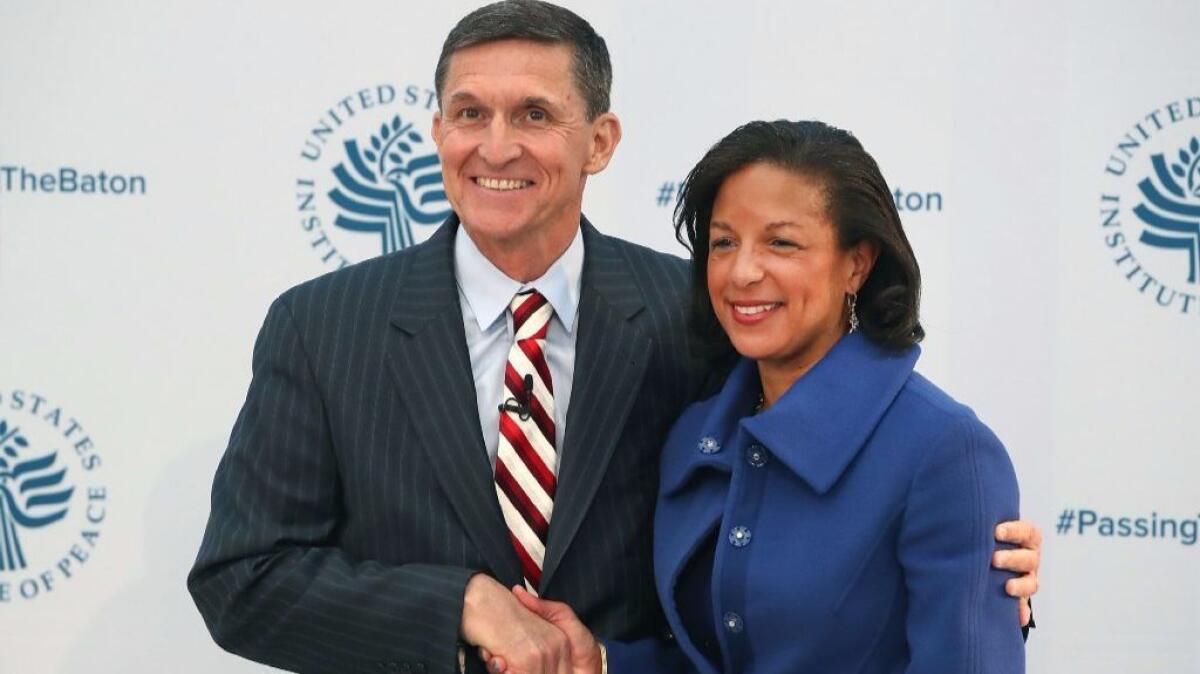Trump’s pick for national security advisor praises some Democrats, but is mum on policy details

At the Republican National Convention last July, retired Army Gen. Michael Flynn famously led Donald Trump’s supporters in angry chants of “Lock her up!” to demand prosecution of Democratic nominee Hillary Clinton.
Flynn has suggested that Americans should fear all Muslims, and argued that terrorism committed by Muslims is rooted in mainstream Islam. “Fear of Muslims is RATIONAL,” he tweeted last February.
So on Tuesday, when Flynn made his first public comments since President-elect Trump picked him to be the next White House national security advisor, a packed hall at the U.S. Institute of Peace waited to hear what the fiery former commander and provocative Trump advisor had to say.
Flynn couldn’t have been more gracious.
After he was introduced by Susan Rice, the outgoing national security advisor, he gushed, “That was an amazing speech.”
He confessed that he was “in awe” of Madeleine Albright, the former secretary of State who had campaigned for Clinton and who sat in the audience.
Rice and Albright have shown “grace, dignity, elegance, commitment to this country,” he declared.
Flynn spoke for just over 10 minutes and offered no details or specific policy ideas to outline his plans in the White House. Reporters were not given time to ask questions.
Trump will stand up for American values overseas in an “unapologetic defense of liberty that is the core value of American exceptionalism,” Flynn said.
“We have always been the indispensable nation, and we always will be,” he said.
He remarks, though larded with foreign policy platitudes, seemed designed to reassure U.S. allies and skeptics at home that the incoming president will not adopt a more isolationist approach to world affairs than previous administrations.
“The world needs us and in fact demands it,” he said.
“What makes our country exceptional is what we are defending every day, and that’s freedom,” Flynn said.
Flynn said the White House National Security Council will help form policy, make sure it is carried out by government agencies, and will ensure that Trump is “properly prepared” to work with Congress and to make decisions on foreign policy and national security issues.
He said nothing about what steps Trump will take to fulfill his vow to improve relations with Russia, as the president-elect has suggested, or whether he agrees with the Obama administration that Russia sought to interfere in the 2016 presidential campaign.
Flynn spoke shortly before FBI Director James B. Comey, CIA Director John Brennan, National Security Agency Director Michael S. Rogers and Director of National Intelligence James R. Clapper testified before Congress for the first time since they released a joint report Friday concluding that Russian President Vladimir had “aspired to help” Trump win and to “harm” Clinton’s chances.
In addition to stealing and leaking emails from the Democratic National Committee and Clinton’s campaign, hackers backed by Russian intelligence penetrated and stole data from state-level Republican servers and old Republican National Committee domains, Comey told the Senate Intelligence Committee.
But he said none of that data was leaked, and that the FBI saw no evidence that the hackers had accessed Trump campaign computers or current RNC servers.
Flynn, who was fired as head of the Defense Intelligence Agency in 2014, sat beside Putin in 2015 in a paid appearance at a dinner hosted by Russia Today, a Russian-government-funded English-language outlet.
RT, as the network is known, openly supported Trump last year and played a major role in Russian efforts to spread disinformation and propaganda during the U.S. election, according to the intelligence report.
As a senior Army intelligence officer, Flynn was a fierce critic of U.S. counter-terrorism operations. He argued that the federal government as a whole and the military in particular were poorly organized to defeat militant groups that relied on secrecy and terror tactics.
He was fired as chief of the DIA, the Pentagon’s main spying agency, after he was critical of what he claimed was the Obama administration’s unwillingness to take more forceful action against Islamist militants overseas.
“It infuriates me when our president bans criticism of our enemies, and I am certain that we cannot win this war unless we are free to call our enemies by their proper names: radical jihadis, failed tyrants, and so forth,” Flynn wrote in a New York Post opinion article in 2015, claiming he was fired for his views.
“If our leaders were interested in winning, they would have to design a strategy to destroy this global enemy,” he wrote. “But they don’t see the global war. Instead, they timidly nibble around the edges of the battlefields from Africa to the Middle East, and act as if each fight, whether in Syria, Iraq, Nigeria, Libya or Afghanistan, can be peacefully resolved by diplomatic effort.”
Staff writer David S. Cloud in Washington contributed to this report.
Twitter: @ByBrianBennett
ALSO
When Trump says he wants to deport criminals, he means something starkly different than Obama
Yes, Trump can boost deportations and gut the Dreamer program for young immigrants
An outsider takes charge of the Border Patrol — and yes, he’ll wear the green uniform
UPDATES:
12:33 p.m.: This article was updated with details from Tuesday’s Senate Intelligence Committee hearing
This article was originally published at 11:30 a.m.
More to Read
Start your day right
Sign up for Essential California for news, features and recommendations from the L.A. Times and beyond in your inbox six days a week.
You may occasionally receive promotional content from the Los Angeles Times.







